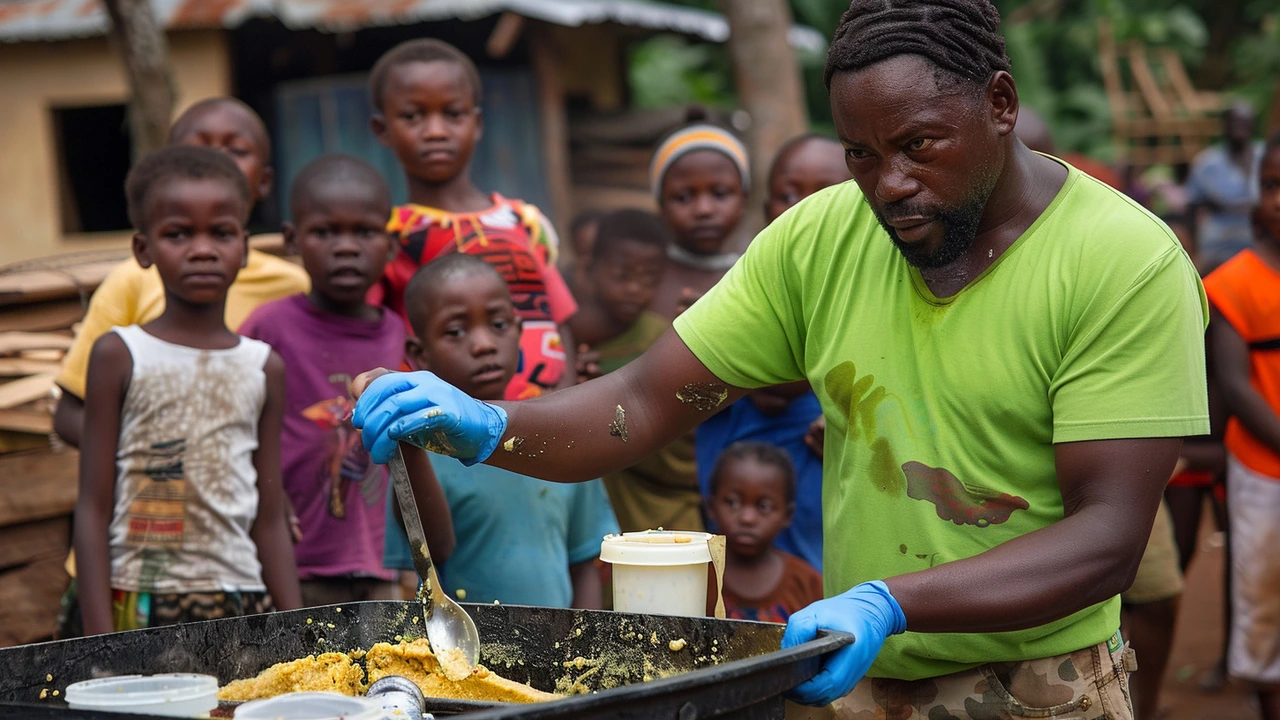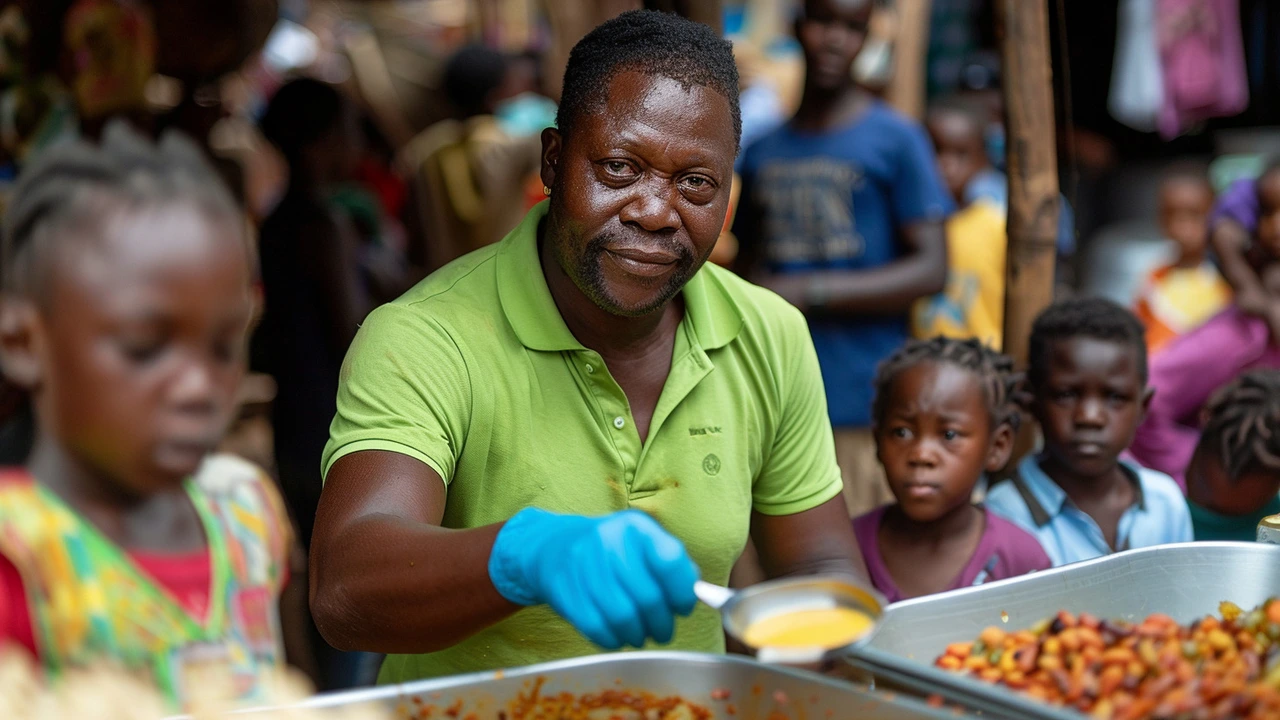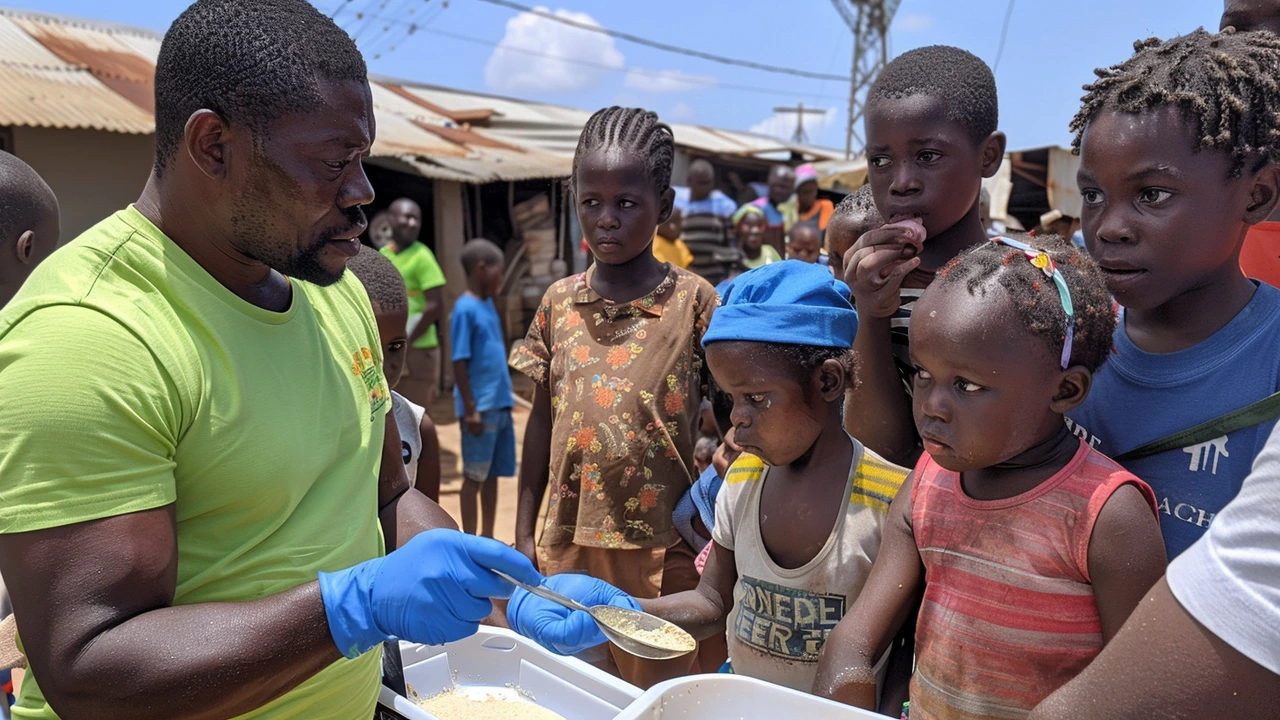Haiti's Children Displaced by Escalating Gang Violence, UN Reports

Gang Violence in Haiti: An Unprecedented Humanitarian Crisis
The United Nations recently reported distressing figures on a humanitarian catastrophe unfolding in Haiti. Since March, gang violence has forced over 300,000 children to flee their homes, making up more than half of the 580,000 individuals displaced across the nation. This alarming surge in violence began in late February, with gangs launching a series of coordinated attacks on government structures and other key facilities, resulting in the resignation of Prime Minister Ariel Henry in April. Catherine Russell, Executive Director of UNICEF, expressed grave concern over the children’s plight, underscoring the dire need for a safe and nurturing environment.
A Nation Under Siege
Currently, gangs control roughly 80% of Port-au-Prince, the capital city, and its main thoroughfares. This stranglehold has resulted in over 2,500 casualties across the nation in just the first quarter of the year. Displaced children and families find themselves living in makeshift accommodations, such as substandard schools, which expose them to significant health risks. The unsanitary conditions in these temporary shelters heighten the likelihood of disease outbreaks, while the closure of schools during this turmoil has led to an increased rate of school dropouts.
The Perils Facing Haiti's Youth
The lack of access to basic necessities, including food, clean water, healthcare, and sanitation, has pressured many Haitian children to seek survival by joining violent gangs. This environment has exacerbated their vulnerability to sexual abuse, exploitation, maltreatment, and family separation. These children are not only fighting for their lives daily but are also combating the invisible chains of poverty, hunger, and disease, with limited international aid coming their way.

Global Call for Intervention
UNICEF's call for increased support and financial assistance from the international community is growing more urgent by the day. Catherine Russell highlighted the necessity of a secure and supportive setting for Haiti’s children, emphasizing that the current conditions are unsustainable and catastrophic for the nation's future. You can only imagine the kind of world these children live in when there's little to no hope, and the community around them is falling apart. It feels like a scene straight out of a post-apocalyptic movie, but it's their reality.
Kenyan Forces: Hope Amidst The Chaos?
In an attempt to curb the spreading violence, a contingent of Kenyan forces has recently arrived in Haiti. Their mission is to help liberate the nation from the grip of armed groups, raising mixed reactions due to the controversial history of a previous U.N. peacekeeping mission. Nonetheless, this development offers a ray of hope for the beleaguered nation.
Discussions have also taken place between U.S. National Security Adviser Jonathan Finer and Haitian Prime Minister Garry Con concerning the preliminary deployment of a U.N.-endorsed operation in Haiti. However, there are pressing concerns about the need for robust oversight mechanisms and accountability within the mission to ensure it effectively addresses the issues at hand.

Another Calamity on the Horizon: The Hurricane Season
As if the situation couldn't be more dire, Haiti is also preparing for an unusually severe hurricane season, predicted to start earlier than expected. The southern coast is already on high alert, with Hurricane Beryl approaching the Caribbean Sea, posing an additional threat to the vulnerable displaced population.
A Call for Humanitarian Action
The convergence of these crises—gang violence, displacement, and impending natural disasters—paints a dire picture of Haiti's immediate future. While local and international agencies are doing what they can, the sheer scale of the problem calls for a much broader and more integrated humanitarian effort. It is not just about sending troops or financial aid but also about creating lasting solutions that address the root causes of this endemic violence and instability.
Building a Brighter Future
Moving forward, the global community must come together, pooling resources and expertise to foster a secure and nurturing environment for the children of Haiti. It's a massive task, but not an impossible one. With coordinated efforts, transparency, and a strong commitment to human rights and dignity, the tide can change. These children, after all, are not just statistics in a grim report; they are the future of Haiti. Giving them the chance to grow up in a safe, supportive environment is not just a moral obligation; it's an investment in a more stable and prosperous future for the entire region.
20 Comments
Michael Laffitte
Man, reading about those kids being torn from their homes feels like a gut punch. The UN's numbers are heartbreaking, and it's clear we need more than just words - we need real help on the ground. If international donors could pump resources into safe shelters and schools, maybe we could give these children a sliver of normalcy again.
Hope that anyone listening can push their reps to act before the next hurricane hits.
sahil jain
It's insane how quickly the situation spiraled - over 300,000 kids displaced in just a few months! 😞 We’ve got to rally support, get more NGOs in there, and make sure those Kenyan forces actually protect civilians, not just chase headlines.
Bruce Moncrieff
Seeing the statistics laid out like that makes it impossible to stay indifferent. The whole country is basically a warzone, and those numbers are just the tip of the iceberg when you think about the trauma these children are enduring every single day.
Dee Boyd
From an ethical standpoint, the systemic failure to safeguard minors in Haiti constitutes a gross violation of both international humanitarian law and child rights conventions. The current governance vacuum exacerbates the proliferation of non-state armed actors, thereby institutionalizing violence against vulnerable populations.
Rahul Sharma
Let us be crystal clear: the displacement crisis in Haiti is not merely a statistic, it is a humanitarian emergency that demands immediate, coordinated, multi‑sectoral intervention! The integration of health, water, sanitation, and psychosocial services must be prioritized, and all stakeholders - UN agencies, NGOs, and donor nations - should align their resources to avoid duplication and maximize impact! Moreover, the upcoming hurricane season adds an urgent temporal pressure that cannot be ignored!
Emily Kadanec
Yo, u probs think dis is just about gangs but it's also about the deep-rooted econmic collapse and foreign intereests. If u read the IMF reports you'll see how debt and bad policies set the stage for all this mess.
william wijaya
Every day those children wake up to gunfire is a stark reminder that the very fabric of society is being ripped apart. The psychosocial toll is beyond measurable, and without a concerted effort to rebuild community resilience, we are condemning an entire generation to perpetual trauma.
Gerald Hornsby
Chaos reigns, but hope flickers in the ashes. 🌟
faye ambit
When we consider the plight of Haiti's youth, we are forced to confront the broader question of our shared humanity. How can we claim progress when a child’s world is reduced to survival amid violence and looming storms?
Subhash Choudhary
Dude, the whole thing feels like a bad movie that just won’t end. Someone gotta step in and fix this before it blows up even more.
Michael Laffitte
Totally feel you, sahil. The numbers are sobering, and the emoji says it all - we need action, not just sympathy. If more folks keep shouting about it, maybe the pressure will finally get the world moving.
Bruce Moncrieff
It’s impossible to read those statistics and not feel the weight of every lost childhood. The streets of Port‑au‑Prince have become battlegrounds where innocence is the first casualty. Children who should be in classrooms are instead hiding in crumbling shelters. Their laughter has been replaced by the echo of gunfire. Families are torn apart as parents are forced to make impossible choices. Even the air feels heavy with fear and uncertainty. The international community watches from afar while the crisis deepens. Every day that passes without decisive action adds another scar to the collective psyche of the nation. The presence of Kenyan troops offers a glimmer of hope but also raises questions about past peacekeeping missteps. Meanwhile the looming hurricane season threatens to turn the already dire situation into a full‑blown catastrophe. Water sources are contaminated and disease spreads like wildfire in the makeshift camps. Education has stalled, robbing a generation of hope and future prospects. The emotional trauma these kids endure will echo long after the violence subsides. We must act now, before the next storm arrives, before more children are forced to grow up knowing only conflict and loss. Only a united global response can rewrite this tragic narrative.
Rahul Sharma
Exactly, Rahul. The multi‑sectoral approach you outlined is the only viable path forward. By synchronizing health, WASH, and education initiatives, we prevent resource wastage and amplify impact. Moreover, establishing clear monitoring frameworks will hold all parties accountable, ensuring that aid actually reaches those displaced children.
Hina Tiwari
i totally feel w/ you william. the trauma is real and the wordz we use barely cover it. maybe we can push for more mental health pros on the scene, even if it's just a few brave souls willing to help.
Barry Hall
Well said, faye. The humanity angle is exactly what's missing from the headlines. 🙌
abi rama
We can turn this tide if we keep the conversation alive and pressure leaders to fund safe zones for these kids.
Megan Riley
Wow, that was an incredibly moving piece!! I absolutely agree with every point you made!! It’s heartbreaking to think about the loss of childhood in such a brutal environment!! Let’s all rally together, spread awareness, and demand immediate action from our governments!!
Lester Focke
While the sentiment expressed by the previous comment captures the emotive aspect, it is imperative to ground our discourse in empirical data and policy frameworks. The intersection of mental health interventions and security sector reforms must be examined through rigorous analysis to ensure sustainable outcomes.
Ethan Smith
The current humanitarian response in Haiti appears fragmented, with multiple agencies operating in parallel without a unified strategy. To maximize efficiency, a coordinated command structure should be established, aligning resources and objectives across all stakeholders.
Michael Laffitte
Coordination is the key to saving those kids.

Write a comment